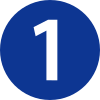
Anguk station, also known as Hyundai E & C station (Korean: 현대건설), is a subway station on the Line 3 of the Seoul Metropolitan Subway. The station is located in the Anguk neighborhood of Jongno District, Seoul and is the nearest subway station to the Insa and Samcheong neighborhoods. The station is also near the ancient royal residence of Unhyeongung.
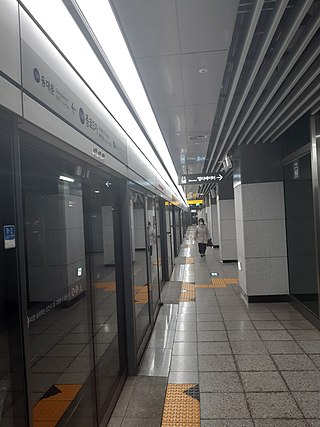
Jongno 5(o)-ga Station is a station on the Seoul Subway Line 1. It is located underneath Jongno, a major street in downtown Seoul.

Seoul National University Station is a station on Seoul Subway Line 2, located in Bongcheon-dong, Gwanak-gu of southern Seoul. This station is also known as Gwanak-gu Office Station. There are eight exits, two at each corner of the crossroads – of Nambu Beltway (Nambusunhwan-ro) and Gwanak-ro – where the station lies beneath.

Dogok Station is a station on Seoul Subway Line 3 and the Suin–Bundang Line in Gangnam-gu, Seoul. This station serves one of the most affluent neighborhoods in Korea; the Samsung Tower Palace complex, which includes one of the tallest buildings in South Korea, has a direct passageway link with the station. Another set of high-wealth residential apartments - the Dongbu Centreville - is also linked by an underground passageway. Other nearby high-wealth apartments include Dogok Rexle complex and Daechi I-Park.

Express Bus Terminal Station is a station on the Seoul Subway Line 3, Line 7, and Line 9. The stations are located in Banpo-dong, Seocho-gu, Seoul.
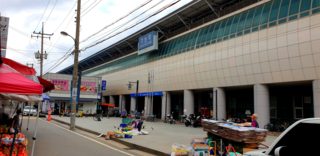
Ganeung Station is a metro station on the Seoul Subway Line 1, located in northern Uijeongbu, South Korea. It was also the northern terminus for Seoul Subway Line 1 until the line was extended to Soyosan.

Chang-dong Station is a station on Seoul Subway Line 1 and Line 4. It is located in Chang-dong, Dobong-gu, Seoul. A shopping center was planned for this site, but the empty lot has never been developed due to the bankruptcy of the contractor behind said project. The station is, however, home to a cluster of pojangmacha stalls.

Onsu Station is a station on the Seoul Subway Line 1. It was the former western terminus of Seoul Subway Line 7. A westward extension of Line 7 was completed in October 2012. It is near the border of Seoul and Bucheon.
Seoksu Station is a station on Seoul Subway Line 1. It is situated on the border of Seoul and Anyang, the station building itself lying in Anyang, hence the address and indeed its name, which is derived from the area of Anyang in which it is located, and the platforms being in Seoul.

Doksan Station is a station on Line 1 of the Seoul Subway. It is an above-ground station located in southwestern Seoul, with service between Uijeongbu and Suwon/Cheonan.

Banghak station is a subway station on Line 1 of the Seoul Metropolitan Subway. It is the closest station to the Dobong-gu District Office in Seoul.
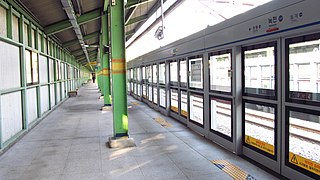
Nokcheon Station is a metro station on Seoul Subway Line 1 in South Korea. It is located in the northern end of the city.

Jihaeng Station is a ground-level metro station on Line 1 of the Seoul Subway in Jihaeng-dong, Dongducheon, South Korea. It opened on January 30, 2005, to services on the Gyeongwon Line and services on the Seoul Metropolitan Subway began calling here on December 15, 2006. The station offers access to Dongducheon Foreign Language High School, Central Middle and High School, Jihaeng Elementary School, Science Tower and Songnae-dong Office, among other places.
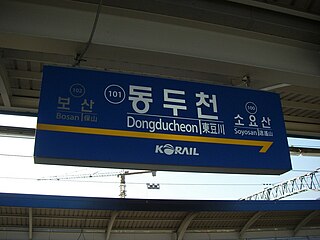
Dongducheon Station is a metro station located in Dongducheon, South Korea. Seoul Subway Line 1 serves this station, and it is the station right before the northern terminus of Line 1, which is Soyosan. Camp Casey, a U.S. Army military base, is located nearby.

Bosan Station is a subway station located at Dongducheon, Gyeonggi-do, South Korea. This station is on the Seoul Subway Line 1. Camp Casey, an American military base, is located nearby.

Dongducheon Jungang Station is a train station on the Seoul Subway Line 1 and the Gyeongwon Line. The name means Dongducheon Central Station. It was also once known as Eosu-dongStation.
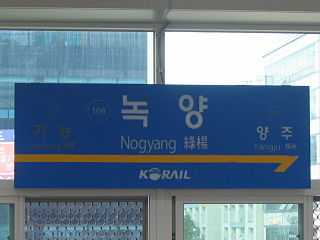
Nogyang Station is a station on the Gyeongwon Line in South Korea. It is served by Seoul Subway Line 1. The station lies in the far northern end of Uijeongbu in Gyeonggi-do.

Yangju Station is a train station on Seoul Subway Line 1 and the Gyeongwon Line. The name comes from Yangju, the city where this station is located. Until December 2007, it was called Junae Station.

Anyang Station is a ground-level subway station on Line 1 of the Seoul Metropolitan Subway. The station is located in the Anyang One neighborhood, in Manan District, Seoul. The station's sole exit offers access to Enter-6 Mall, which occupies the same building. Travel time from Anyang Station to Seoul Station on Line 1 is approximately 40 minutes. Anyang Station is the main station in Anyang, but there are another six stations in Anyang, namely Beomgye, Pyeongchon and Indeogwon on Line 4, and Myeonghak, Gwanak and Seoksu on Line 1, though the latter's platforms lie within Seoul. It is connected with Lotte Dapartment Store.

Deokjeong Station is a station in Seoul Subway Line 1. On October 15, 1911, the service started. In 2006, it started to operate the metropolitan train.




















